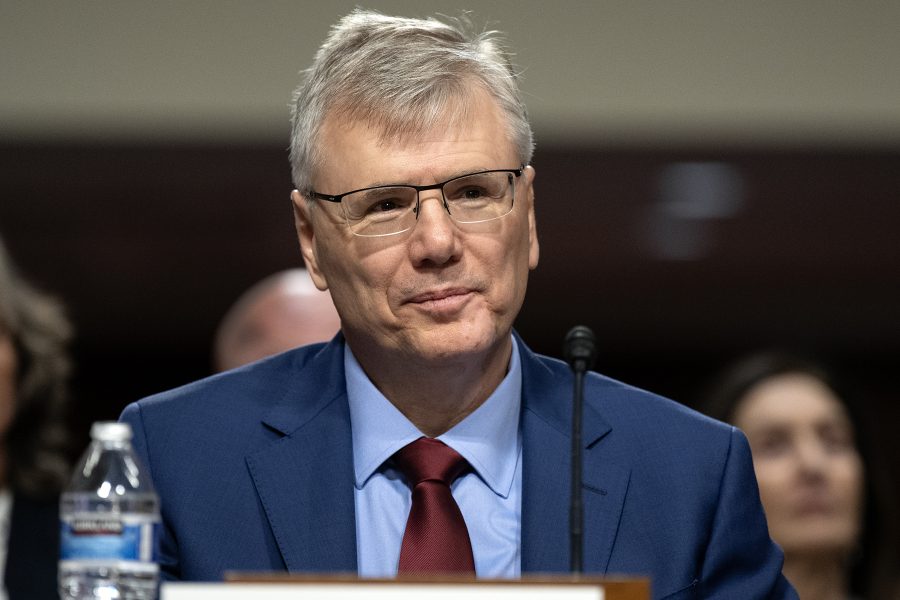Troy Meink, nominee to be Secretary of the Air Force, appeared closely aligned to the Space Force’s vision of “space control” and the need for counter-space weapons to ensure U.S. space superiority in future conflicts.
In written and verbal testimony before the Senate Armed Services Committee on March 27, Meink echoed the language of Chief of Space Operations Gen. B. Chance Saltzman, who has increasingly emphasized the need for space control in recent weeks.
Asked by Sen. Deb Fischer what systems he thinks the Space Force needs most, Meink answered: “Some of the space control and counter-space systems are critical.” Though he declined to go into detail because much of space work is classified, he added, “That is probably the area we are being most stressed in from a threat perspective.”
Likewise, in written testimony he also aligned with Saltzman, saying: “USSF investment priorities focus on achieving space superiority through space control.”
Meink is uniquely equipped to understand the issues facing the Space Force, having spent much of his career in the space acquisition world, most recently as principal deputy director at the National Reconnaissance Office. That means he has perhaps the deepest space background of any prior Air Force Secretary nominee.
In written testimony, he said “the Space Force must prioritize space domain awareness, resilience, and capabilities that ‘hold at risk’ adversary spaces assets to protect the Joint Force.” He also argued the Space Force “must reinforce the warrior ethos within our Guardians, providing them with the equipment, the tactics, and the training required to use military force to control the space domain.”
Saltzman uses similar language. In a March 26 visit with AFA’s Mitchell Institute for Aerospace Studies, Saltzman said space control is now “a critical function” for the U.S.
“It used to be OK to take advantage of the benign domain and do ISR and PNT and focus on doing those missions very well, delivering those services to the warfighters,” he said. “It’s just no longer sufficient. Now we have to be able to control the domain.”
Earlier in March, Saltzman opened the 2025 AFA Warfare Symposium pledging that the Space Force “will do whatever it takes” to control the space domain, including destroying adversaries’ satellites when and if necessary.
He later said the Space Force needs offensive weapons to be able to disrupt China’s ability to use space to target U.S. troops and to ensure U.S. access to the domain in order to support the joint force on the ground, at sea, and in the air. Operating “under stressing conditions of crisis and conflict requires a purpose-built organization, tailor-made with the institutions, the equipment, the tactics, the training, the warrior ethos required to use military force to control the space domain,” he said. “In other words, it requires a Space Force.”
The Space Force is military in nature, Saltzman said. “The mix of weapons based on the targets is always a military consideration, and when I look at the space-enabled targeting architecture that [China] has built, it’s pretty impressive,” he said. “It’s in all orbital regimes. It’s in the hundreds of satellites. And to give the president options requires a mix of systems to be able to go across the full spectrum of operations to all orbital regimes. There are some things that are purpose-built for low-Earth orbit effects, others in GEO. And so the more weapons in the mix we have, the more options we can offer.”
Meink echoed those ideas in his testimony, writing that the Space Force “needs to continue developing offensive and defensive space control capabilities to successfully prosecute a war in space and to conduct operations at a time and place of our choosing.”
Talented people is what makes that possible, Meink said. “I think the key to both acquisition and operations is making sure you have the best talented workforce,” he said during the hearing. “These are some of the most complicated systems, and if the U.S. is going to maintain our advantage, which we need to do in space, we need to make sure we have the right workforce.”
Saltzman has argued increasingly strongly that the Space Force is too small, and that it needs both more funding and more people.
Meink agreed. “The Space Force is in the process of growing. I will support that activity, to make sure we have the right numbers and the right skill set, and then make sure that the acquisitions themselves are delivering and that they’re getting into operations.”
Sen. Kevin Cramer (R-N.D.) questioned Meink about uncertainty surrounding the Space Development Agency since its leader, Derek Tournear was suspended in January. Cramer suggested the agency might be considering canceling plans for more low-Earth orbit satellites in favor of leveraging commercial products from SpaceX—which the senator said would harm industry competition.
“One of the things that I have pushed for, particularly over the last 10 years, is expanded competition and expand the industry base,” Meink replied. “That ends up almost always with the best result, both from a capability and cost to the government. I’m not familiar with those discussions going on within the Pentagon. If confirmed, I look forward to diving into that and assessing where they’re going.”
